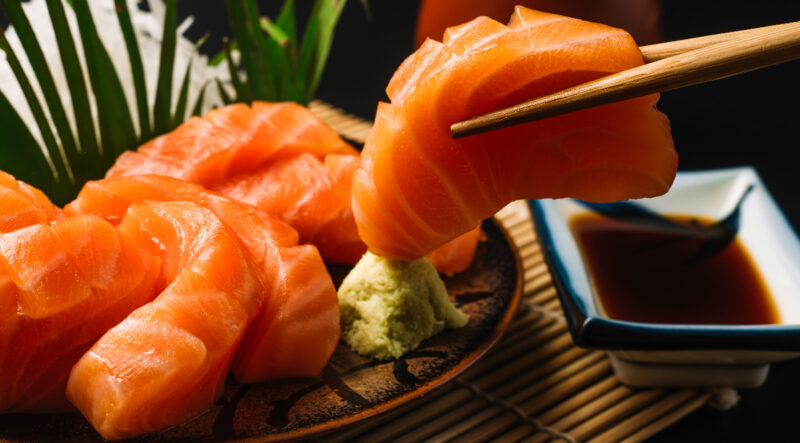Salmon, it does a body good
Examples of oily fish include: Steelhead trout, which are farmed right here in British Columbia, and salmon, also farmed in BC.
By Samantha Bacchus McLeod
SeaWestNews
Do you ever feel completely exhausted from having debates with people about the benefits of farmed salmon? The topic usually rears its fishy head during sushi dinners, enjoyed in and around Vancouver, the “sushi capital of North America”.
One side of the debate lauds the merits of wild salmon, the other lauds the practicality of farmed salmon. Usually the argument is conducted over the group’s gluttonous inhalations of platters of sushi and sashimi; mostly salmon, wild and farmed. To be accurate, mostly farmed salmon.

Farmed fish is delicious and it looks fantastic on a bed of ice, it brings pizzazz to any presentation. If it is pressed farmed salmon like oshi sushi, it is a thick piece that is seared medium – it looks and tastes better than the wild salmon order, which is a tiny sliver of overcooked fish that is more a hint of wild salmon.
It is a well-known fact that I am a passionate proponent of food farming in Canada. We have enough land and water to produce more food than we currently grow. Fruits and vegetables can be grown in abundance if more citizens would get on board the farming movement – we should not be anxiously awaiting shipments from California, Mexico, and even as far away China (where traceability is almost impossible).
We are very fortunate that we are capable of producing more than ample amounts of dairy products, and poultry and eggs, to feed the country. But then again, that is probably because those two industries are very vocal (political) in what they want and how it benefits Canadian businesses. Some see these industries as a cartel, while I view it as “Woohoo, we are able to grow more food than we need!”
Then there is farmed seafood, where most farmed seafood are darlings of the media, where some farmed seafood keep a low profile, and where one farmed seafood is singled out for all kinds of conjecture by anti-food-growers individuals.
These literal digital-devices warriors live in a land of plenty, they are clueless to the serious issue of food-insecurity, and witless to boot. They spend an insurmountable amount of energy trying to dismantle a valid most-needed industry. These people are so entrenched in their forcible indoctrination that they have lost the ability to have a proper debate. They can only repeatedly cry foul, as instructed by their powers that be.
Now, I have said my piece, let us not forget the incredible benefits of eating salmon. Oily fish has been linked to many health benefits, including lower risks of heart disease, improved mental ability, and protection from rheumatoid arthritis, amongst other ailments.
Fish oil contains the two fatty acids, eicosapentaenoic acid (EPA) which is one of several omega-3 fatty acids. It is found in cold-water fatty fish, such as salmon. And docosahexaenoic acid (DHA) the other important omega-3 fatty acid; the body needs DHA for a healthy brain. Oily fish contain significant amounts of oil throughout their body tissues and in their belly cavity.
Examples of oily fish include:
Steelhead trout, which are farmed right here in British Columbia.
Salmon, also farmed in BC.
Wild salmon that may have escaped the open-sea pirates.
Sardines, which are aplenty out East, and can be bought canned anywhere in the world.
Most adults should eat at least 8 ounces – or two servings – of omega-3-rich fish a week, that is the general guidance in North America. Meanwhile, China, Myanmar, Vietnam, and Japan eat quite a lot more…in Japan, people eat about 3 ounces of fish daily.

